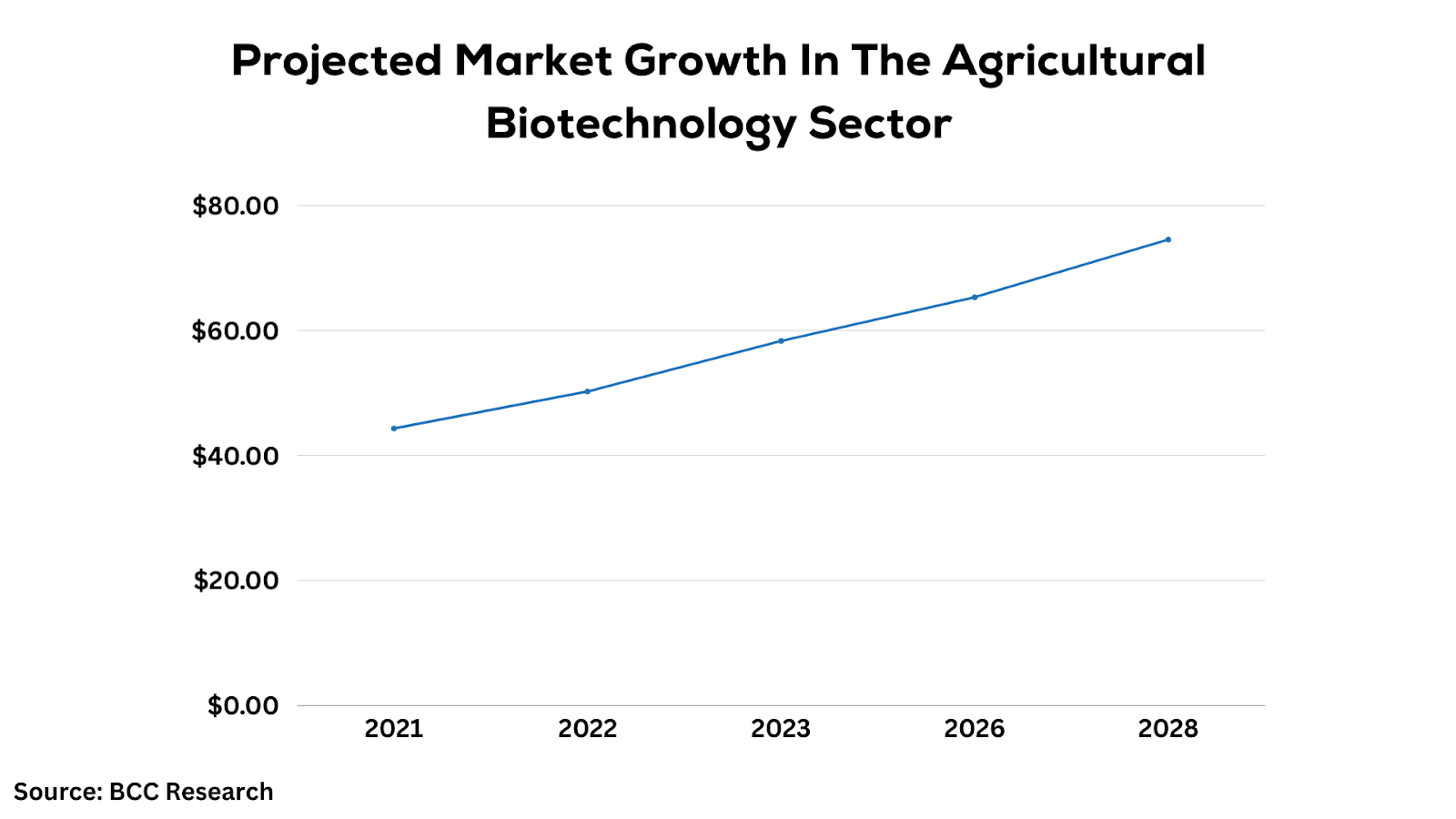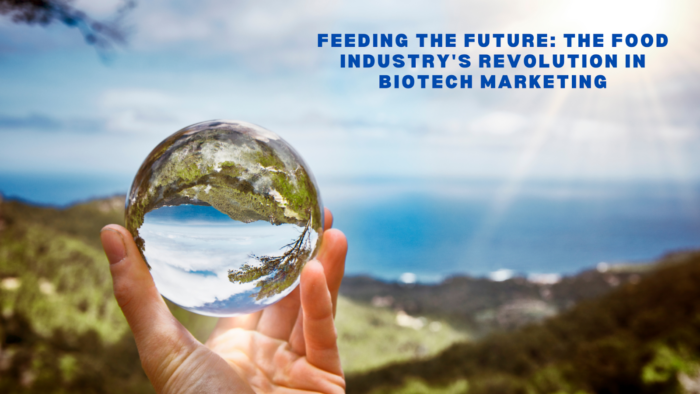Major changes are happening in how we grow and make food, thanks to new biotech discoveries. From gene-edited plants to meat created in labs, these scientific innovations are transforming food production, sustainability, and marketing. And it comes at a crucial time too.
With the global population projected to reach 10 billion by 2050, we must find ways to provide nutritious food to everyone on Earth in an environmentally sustainable manner. With the global population projected to reach 10 billion by 2050,
Would you fancy lab-grown chicken for dinner? We’re entering a new era for the food industry, and I can sense the future. Certainly, much more work needs to be done to make these innovations viable solutions for addressing global food security concerns.
The Global Food Crisis and Biotech Solutions
The world faces a major food crisis in the coming decades. With the global population rising swiftly to a projected 9.1 billion by 2050, food demand is expected to increase by over 50 percent in that time. Outdated farming techniques, supply chain inefficiencies, climate change impacts, and lack of access to nutritional food exacerbate food scarcity issues, especially in developing nations.
However, this is an urgent challenge that companies are striving to address with advancements in food biotechnology. For companies looking to market their biotech products effectively, there are specialized biotech marketing companies that focus on strategic life sciences marketing.
Genetically engineered high-yield, pest-resistant crop varieties and precise gene editing tools like CRISPR enable higher productivity with fewer resources. For example, drought-tolerant GM maize has increased yields by 29-52% for African small farms vulnerable to climate fluctuations.

Besides production gains, agricultural biotech improves storage, nutritional content, and transportation all vital in enhancing global food security. The market for agricultural biotechnology alone is predicted to reach $74.55 billion by 2028, expanding at an 8.4% CAGR from 2021 to 2028.
Genetically modified (GM) crops also mitigate the impacts of climate stresses, thereby enhancing the sustainability of agriculture in the face of extreme weather events. Flood-tolerant rice meant for South Asian cultivation resists being completely submerged, securing harvest viability for millions of small farms. Slow-ripening fruits engineered to last for weeks longer contribute to a reduction in food spoilage, consequently lowering emissions from organic waste in landfills.
Advanced testing methodologies further assure health safety for novel biotech foods entering consumer markets. Established in 2020, the International Standard for Food Safety Assessment derived from recombinant DNA biotech also updates past frameworks for improved precision and reliability.
Innovations in Food Sustainability
With climate change and sustainability becoming leading concerns for consumers, biotechnology also enables the food industry to reduce its environmental impact. Companies are engineering meat and dairy replacements from plants, algae, fungi, and cultured cells to provide options for lowering carbon emissions from livestock. For example, Impossible Foods engineered heme from soy plants to replicate the taste, aroma, and sizzle of beef minus the cow.
Such alternative proteins and rising flexitarian lifestyles signal enormous possibilities. Barclays predicts the market for meat alternatives to reach $140 billion within the next decade capturing 10% of the global meat industry.
Besides alternative foods, food tech also makes mainstream production cleaner. Microbes and enzymes crafted through synthetic biology cut down the need for chemicals and artificial additives in processing. GM crops lessen the usage of water, land, and carbon-spewing fertilizers in farming. Additionally, innovations in smart packaging are eliminating food spoilage- which currently sees over 30% of food go to waste.
As novel foods and technologies enter the fray, however, appropriate policies and testing for allergenicity, toxicity, and nutrition must address safety concerns, especially for vulnerable groups. Luckily, advanced risk assessment frameworks are developing alongside the science enabling measured innovation in this domain.
Biotech Marketing in the Food Industry
While biotechnology transforms food production radically, it also changes how these products reach and appeal to consumers. E-commerce and online meal delivery integrate technology across production, processing, buying channels, and retail. Food management apps connect users to recipes, restaurants, personalized nutrition plans, and on-demand options conveniently.
Consumer values are increasingly shaping the branding and positioning strategies of food tech companies. Surveys indicate that shoppers balance benefits such as taste, quality, transparent sourcing, and sustainability when making purchase decisions. Consequently, astute biotech marketing today goes beyond functional attributes and emphasizes commitment to people, animals, and environmental conservation.
For example, plant-based meat producer Impossible Foods stresses how its products require 96 percent less land and 87 percent less water versus traditional beef burgers. Their website creatively quantifies sustainability gains with an artistic meter calculating water savings from each Impossible Burger sold. Such methods portray social responsibility and eco-conscious production as much as the health advantages expected of meat alternatives.
Furthermore, 3D food printing on demand, robotic automated restaurants with minimal human staff, and seamless cross-channel delivery are integrating food tech innovations. Brands like Solar Foods and Air Protein in alternative proteins source from raw materials as unconventional as electricity, carbon dioxide and elements present abundantly in air. Food and biotech hence merge to creatively market products matching consumer priorities like sustainability through innovation.
The Future of the Food Industry with Biotech
As analytics, AI, robotics, and synthetic biology advance, they uncover possibilities once only imaginable. The emerging category of functional foods touts optimized nutrition merging health with taste delightfully. Nutraceuticals, prebiotics, probiotics, personalized nutrition, and cognitive foods pamper consumers while preventing diseases via optimal nourishment.
CRISPR gene editing pursuant enables growing nutrient-boosted crops and livestock. Biofortification through genetics introduces health-boosting compounds like vitamin A, iron, and zinc lacking in staple foods for malnutrition-affected populations. Companies also craft safer specialty ingredients for groups with food allergies or intolerances.
Additionally, 3D food printing on demand, robotic automated restaurants with minimal human staff and seamless cross-channel delivery integrate food tech innovations. Over two-thirds of consumers state that digital technologies improve their eating and buying experience, indicating significant opportunities for food companies. Investor interest and job opportunities in this sector indicate a thriving future food system with biotechnology at its core.
Conclusion
For sure, biotech is gonna be crucial for tackling urgent food issues like shortages, emissions from farming, and getting nutrition to everyone. Technology breakthroughs could revolutionize our entire food system for the better. However, for these innovations to go mainstream, smart marketing, clever policies, and clear consumer communication will be important too.
Food companies have to highlight the advantages of lab-grown or gene-edited products, while also addressing concerns some groups have about new technologies changing how we eat. Indeed, it’s a balancing act! Mastering that clear and compassionate communication with consumers builds vital trust.
With open and responsible leadership and a focused vision on sustainably nourishing 10 billion humans, we believe that companies, governments, and scientists can transform food systems using modern biotechnologies. However, they must also bring the public along through education and transparency. Exciting times lie ahead in food innovation if key players concoct the perfect recipe by combining technological breakthroughs with ethical implementation.
Frequently Asked Questions
What is the role of biotechnology in addressing the global food crisis?
Biotechnology helps address the global food crisis through higher yielding, nutritionally rich GM crops, more resilient to climate change, progress in lab-grown meats and other alt-proteins reducing emissions, and biofortified foods fighting malnutrition.
How are digital and biotechnologies improving food sustainability?
Food tech promotes sustainability through initiatives such as supply chain tracking to reduce waste and clean meat production, which eliminates pollution from factory farming. Biotech also enables cleaner processing, eco-friendly packaging, and digitization enhancing transparency.
What are the key considerations in biotech marketing within the food industry?
Key considerations include conveying product health advantages, ethical and eco-friendly sourcing, positioning against less sustainable options, and merging biotech seamlessly into consumer trends around quality, sustainability, and experience.
Source: ArticleCube


